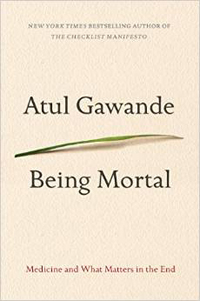Book Notes
 Atul Gawande, Being Mortal; Medicine and What Matters in the End (New York: Metropolitan Books, 2014), 282pp.
Atul Gawande, Being Mortal; Medicine and What Matters in the End (New York: Metropolitan Books, 2014), 282pp.
By Dan Clendenin
Atul Gawande is a general surgeon at Brigham and Women's Hospital in Boston, a professor at Harvard Medical School, and the author of three previous best-selling books — Complications; A Surgeon's Notes on an Imperfect Science (2003), Better: A Surgeon's Notes on Performance (2008), and A Checklist Manifesto; How to Get Things Right (2009). In her own review, Marcia Angell, former editor in chief of the New England Journal of Medicine, calls Being Mortal Gawande's best book yet.
Gawande says that instead of acknowledging "the natural order of things," we have been seduced by "the prevailing fantasy that we are ageless." Instead of acknowledging the limits of medical treatments, we have turned mortality into an almost purely "medical experience," which in turn has led to denial, dishonesty, arrogance, and, for the elderly and the dying, horrible social isolation. Whereas the vast majority of people used to die at home among a multi-generational family, by the 1980s only 17% did. This reduction of mortality to medicine, says Gawande, has done tremendous harm instead of healing.
As in his previous books, most of Gawande's narrative is composed of clinical anecdotes from his medical practice. This makes for simple, powerful, and at times very disturbing story-telling. He also writes at length about his own family's struggles with aging and dying — his wife's grandmother, his grandfather in India who lived to be 110, and, most poignantly, his own father. Both of his parents were physicians, so between the three of them they had 120 years of medical expertise, but when his father was diagnosed with a tumor in his spinal cord, they "stepped through the looking glass." They had to acknowledge that "we were up against the unfixable. What were we to do? It seemed a mystery."
There are positive alternatives to spending all of your money and your last days drugged out of your mind, hooked up to multiple machines, and isolated in the ICU. Gawande explains the history of nursing homes, hospice care, assisted living, and even other creative alternatives. "There are people in the world," he writes, "who change imaginations." Acknowledging your mortality is a tremendous gift. It reorders your desires. It narrows your focus and gives you a new perspective that's rooted in reality instead of futile medical fantasies. Medical interventions are only justified, says Gawande, "if they serve the larger aims of a person's life. When we forget that, the suffering we inflict can be barbaric. When we remember it the good we do can be breathtaking."
See Marcia Angell's review, NYRB (January 8, 2015).


